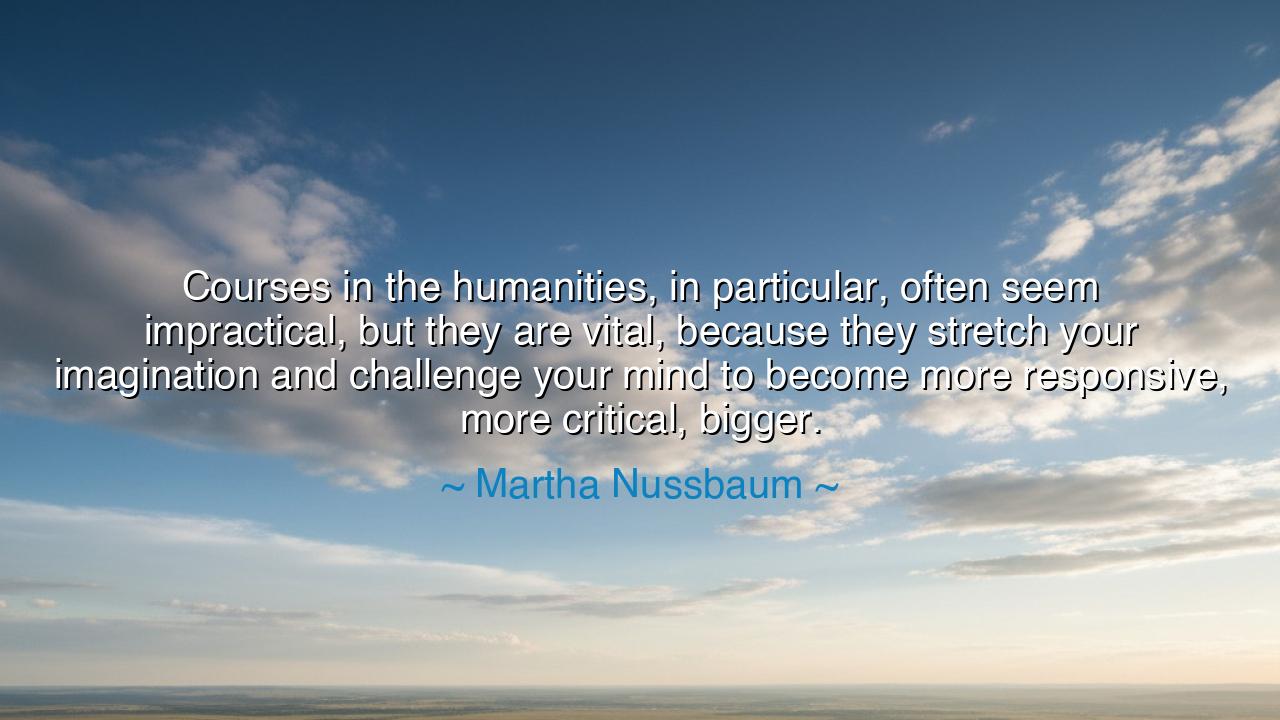
Courses in the humanities, in particular, often seem impractical
Courses in the humanities, in particular, often seem impractical, but they are vital, because they stretch your imagination and challenge your mind to become more responsive, more critical, bigger.






When Martha Nussbaum declared, “Courses in the humanities, in particular, often seem impractical, but they are vital, because they stretch your imagination and challenge your mind to become more responsive, more critical, bigger,” she spoke not only as a philosopher, but as a guardian of the soul’s education. Her words shine like a beacon in an age consumed by efficiency and profit, reminding us that true wisdom lies not in utility alone, but in the expansion of the mind and the awakening of the imagination. To her, the humanities—philosophy, literature, history, art, and music—are not mere ornaments of culture, but the living roots of human dignity. They do not train us to build machines or balance accounts; they train us to think, to feel, to imagine, and to understand what it means to be human.
The origin of this wisdom arises from Nussbaum’s lifelong defense of liberal education. She has stood against the narrowing of the human spirit that occurs when learning is reduced to a marketplace of skills. In her time, many nations began to forsake the humanities, deeming them “impractical” in a world obsessed with technology and commerce. Yet Nussbaum saw the danger in this reasoning: a civilization that forgets its humanities forgets its humanity. She knew that knowledge divorced from imagination, and reason untempered by empathy, lead not to progress, but to cruelty. Her teaching, therefore, is not about classrooms and degrees—it is about the cultivation of the human soul.
To stretch the imagination is to make the mind spacious enough to hold other lives, other perspectives, other worlds. The humanities do this by leading us beyond ourselves. In reading a poem, we enter the heart of another; in studying history, we learn humility before time; in contemplating art, we perceive the infinite in the finite. These acts awaken within us the capacity for responsiveness, the ability to feel and think deeply about the joys and sufferings of others. Without this stretching of the inner self, the mind grows small, rigid, and blind to the vastness of life. The humanities, then, are not impractical—they are the most practical of all, for they teach us to be fully human.
Consider the story of Nelson Mandela, who, imprisoned for twenty-seven years, kept alive his spirit not by wealth or technology, but by the humanities. He read the classics—Shakespeare, Tolstoy, and Sophocles—and through them, kept his imagination free even when his body was chained. These stories gave him perspective, courage, and empathy; they made his mind “bigger,” as Nussbaum would say, able to forgive rather than to hate. In the depths of despair, it was not the “useful” skills of commerce that sustained him, but the inner strength nourished by the humanities—the strength to envision a world beyond vengeance.
Yet in our age, many have forgotten this truth. The humanities are dismissed as luxuries, irrelevant to the world of business and industry. But Nussbaum calls us to see that a society built only on productivity is like a body without a soul—it may move efficiently, but it cannot love, it cannot dream, it cannot mourn. The imagination, once stifled, leads to the decay of compassion, and with it, the decay of democracy. For democracy, she teaches, depends upon citizens who can see one another as equals, who can think critically about justice, and who can imagine the lives of others. These are not skills that machines can teach, but gifts that the humanities awaken.
To make the mind more critical is to make it alive, questioning, and free. The humanities do not give us answers—they give us the courage to ask. They train us to look at the world with both reason and wonder, to weigh the truths of the intellect against the wisdom of the heart. A “bigger mind,” in Nussbaum’s vision, is one that refuses to be confined by prejudice, fear, or ideology. It is a mind that listens to the voices of the dead and the living, the strong and the weak, the familiar and the foreign—and finds in them all the threads of a single human story.
So, my listener, let this teaching dwell in your heart: do not despise the impractical, for it is often the foundation of the eternal. Study the humanities not for wealth, but for wisdom; not for status, but for strength of soul. Read deeply, question bravely, imagine boldly. For when you do, your mind will become bigger, and your spirit will grow gentler, wiser, and freer. The measure of education is not how much you know, but how deeply you can understand and feel.
Thus, as Martha Nussbaum reminds us, the humanities are the lifeblood of civilization. They are the forge where thought becomes compassion, where imagination becomes vision, and where knowledge becomes wisdom. Cherish them, for in a world that prizes machines, it is they that keep us human. And when the world asks for what is useful, remember this: the most useful thing of all is a heart enlarged by imagination, and a mind awakened by the beauty of the human spirit.






AAdministratorAdministrator
Welcome, honored guests. Please leave a comment, we will respond soon